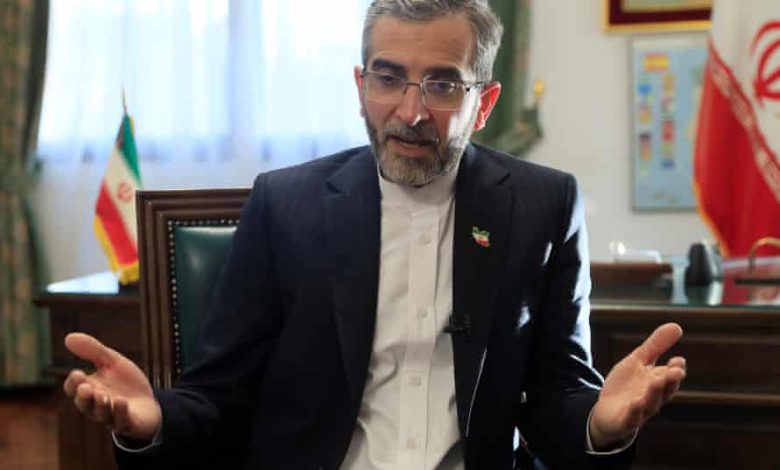Tension mounts as Iran’s retalatory attacks on Israel set

Iran has insisted on its right to an “appropriate and deterrent response” against Israel as the White House said it had prepared for what could be significant attacks by Iran or its proxies as soon as this week.
The comments come as the Umited States announced it had ordered the deployment of the USS Georgia, a nuclear-powered guided-missile submarine, to the Middle East, amid mounting concern over the determination by Iran and its proxies to retaliate for Israel’s assassination of Hamas political leader, Ismail Haniyeh, in Tehran.
Iran’s Acting Foreign Minister, Ali Bagheri Kani, made the comments to his Chinese counterpart on Monday August 12, 2024, according to state media.
John Kirby, the White House national security spokesperson, said Iran’s response to the killings “could be this week” but that “it is difficult to ascertain at this particular time, if there’s an attack by Iran or its proxies, what it could look like”. He said the US and its allies were preparing for a “significant set of attacks”.
As fears grow of an imminent attack, the Israel air force commander, Maj Gen Tomer Bar, issued an order forbidding career officers from travelling abroad for holidays, a day after it was reported that soldiers travelling in Georgia and Azerbaijan had been told to return to Israel immediately.
Earlier, the leaders of France, Germany and Britain called on Tehran to refrain from any retaliatory attacks that would further escalate regional tensions after the killing of Haniyeh, and of a Hezbollah leader in Beirut last month.
A joint statement signed by the French president, Emmanuel Macron, the German chancellor, Olaf Scholz, and the British prime minister, Keir Starmer, endorsed calls for a ceasefire in Gaza, the return of scores of hostages held by Hamas and the “unfettered” delivery of humanitarian aid.
“The fighting must end now, and all hostages still detained by Hamas must be released. The people of Gaza need urgent and unfettered delivery and distribution of aid,” the statement said.
Starmer and Scholz made phone calls to Iran’s new president, Masoud Pezeshkian, appealing to him to do everything possible to prevent further military escalation. The prime minister told Pezeshkian that there was “a serious risk of miscalculation and now was the time for calm and consideration”, according to a British government spokesperson.
The rapidly rising tensions have been driven by remarks by Iranian and Israeli officials that Tehran was on the brink of a large-scale retaliatory attack.
On Friday, an Islamic Revolutionary Guards Corps deputy commander told local news agencies the country was preparing to carry out an order by the supreme leader, Ayatollah Ali Khamenei, to “harshly punish” Israel over the assassination of Haniyeh on 31 July.
Axios reported that the Israeli defence minister, Yoav Gallant, had told the US defence secretary, Lloyd Austin, in a conversation on Sunday that Iran was preparing for a large-scale military attack on Israel within days.
In a statement on Monday, Gallant’s ministry confirmed the call took place overnight. It said Gallant and Austin had discussed operational and strategic coordination and the Israeli military’s readiness in the face of Iranian threats.
The US military had already said it would deploy additional fighter jets and navy warships to the Middle East as Washington seeks to bolster Israeli defences.
The growing fear of an Iranian attack has caused a number of international airlines to cancel flights to the region.
On Monday, the German airline Lufthansa said it was extending the suspension of flights to Tel Aviv, Tehran, Beirut, Amman and Erbil to 21 August, adding it would also avoid using Iranian and Iraqi airspace.
The mounting danger of a wider confrontation with Iran and its proxies comes amid a continuing Israeli assault on Gaza, where officials from the Hamas-run health ministry have said almost 40,000 Palestinians have been killed since the conflict broke out in October when Hamas launched a surprise attack on southern Israeli communities.
On Sunday, the Israeli military ordered more evacuations in southern Gaza, a day after a deadly missile strike on a school turned shelter in the north killed at least 80 Palestinians, according to local health authorities. The strike was one of the deadliest attacks in the 10-month war.
Israel has repeatedly ordered mass evacuations as its troops return to heavily destroyed areas where they previously battled Palestinian militants. The vast majority of Gaza’s population of 2.3 million people has been displaced, often multiple times, in the besieged territory 25 miles (40km) long by about 7 miles (11km) wide.
The latest evacuation orders apply to areas of Khan Younis, Gaza’s second-largest city, including part of an Israeli-declared humanitarian zone from which the military said rockets had been fired. Israel accuses Hamas and other militants of hiding among civilians and launching attacks from residential areas.
The humanitarian zone has steadily shrunk during the war with the various evacuation orders. Hundreds of thousands of people have crammed into squalid tent camps with few public services, or sought shelter in schools, though the UN says hundreds of those have been directly hit or damaged.
The EU’s foreign policy chief said it should consider imposing sanctions in response to calls by Israel’s far-right national security minister to cut off aid to Gaza.
Josep Borrell said on X late on Sunday that the recent remarks by Itamar Ben-Gvir constituted “incitement to war crimes”, adding that “sanctions must be on our EU agenda”.
In his own post on X and in media interviews, Ben-Gvir said that instead of agreeing to a potential ceasefire deal, Israel should block the entry of humanitarian aid and fuel to Gaza until Hamas releases all of the hostages, saying that doing so would bring the militant group to its knees.
Ben-Gvir has repeatedly called for Israel to permanently reoccupy Gaza, rebuild Jewish settlements there and encourage the “voluntary” migration of Palestinians from the territory. A key member of Benjamin Netanyahu’s governing coalition, he has threatened to bring the government down if it makes too many concessions in the ceasefire talks.
Borrell called on Israel’s government to “unequivocally distance itself from these incitements to commit war crimes”, and to engage “in good faith” with ceasefire negotiations mediated by the US, Qatar and Egypt.
With Agencies









